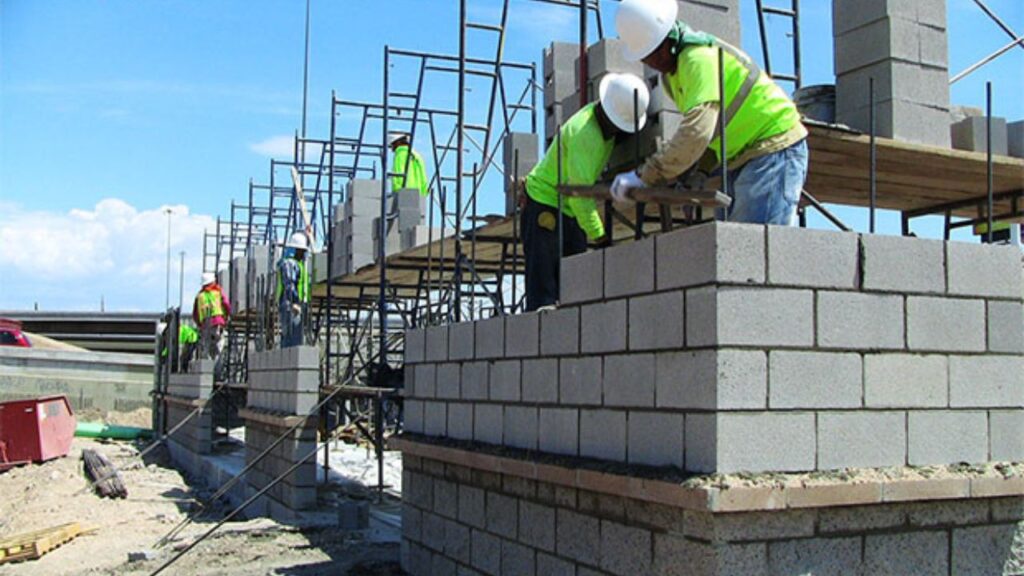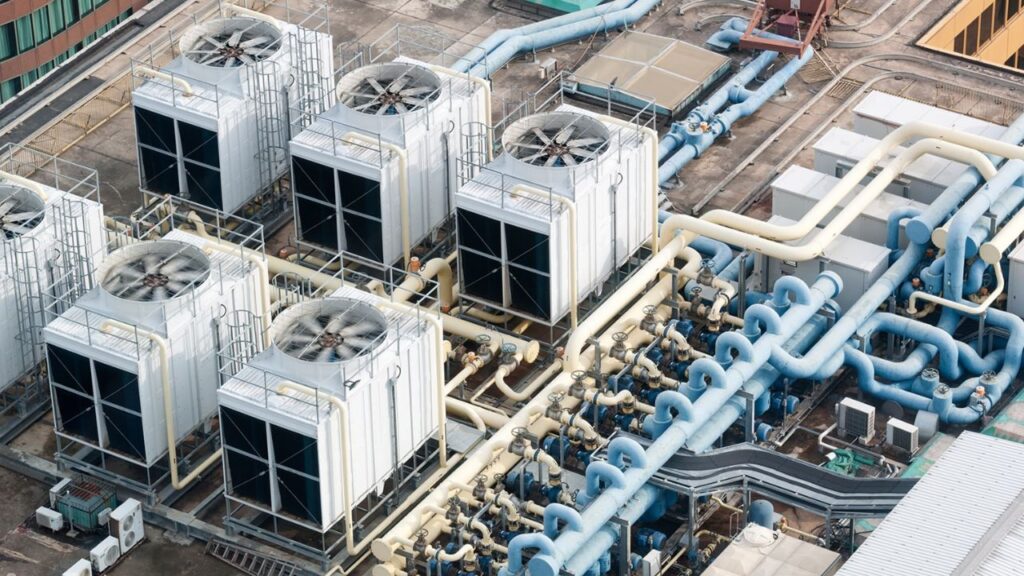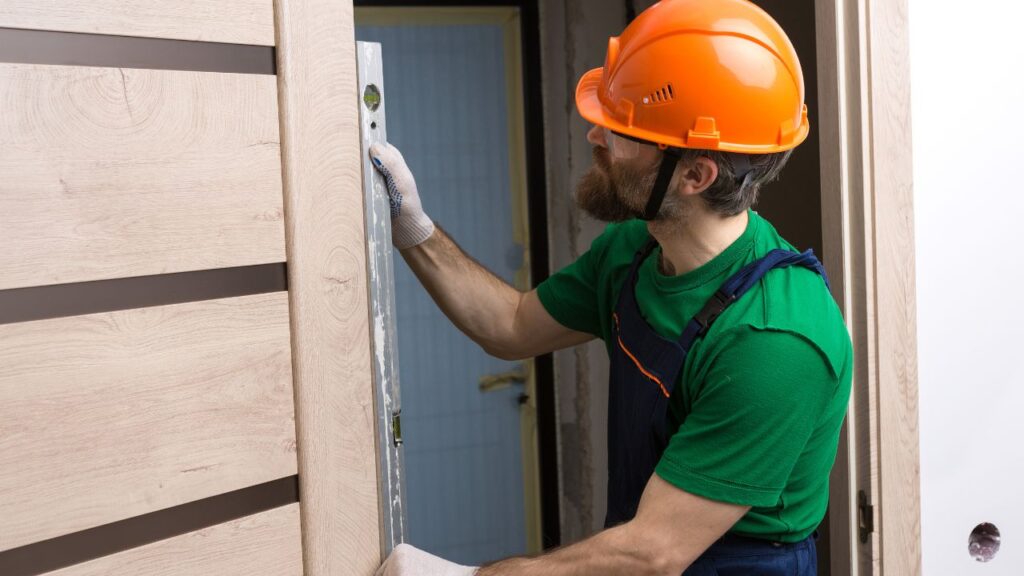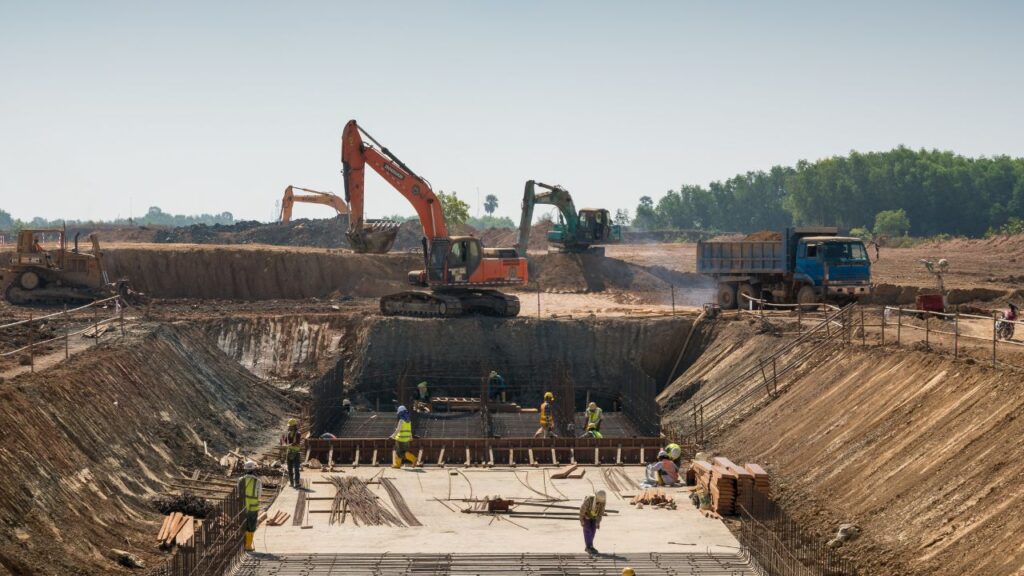One of the most common ways to estimate masonry expenses is by looking at the cost per square foot. In Miami-Dade County, the cost of masonry work can range widely depending on the scope and complexity. For standard residential projects, masonry costs might average between $15 and $35 per square foot, while high-end finishes or complex designs may push costs beyond this range. Factors like intricate detailing, reinforced concrete block assemblies, and premium veneer materials can increase the price. Working with a professional estimator ensures that your cost per square foot calculation accounts for every nuance, from site preparation to final finishing.
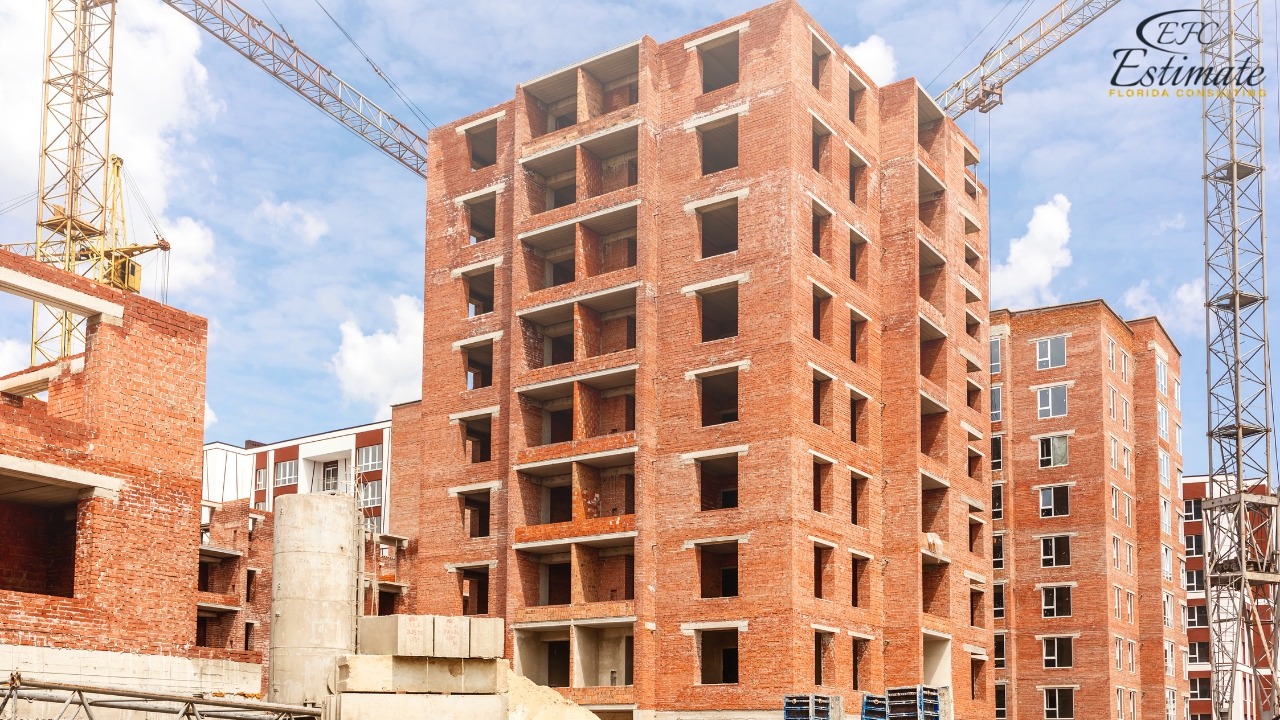
Masonry Construction Types
Masonry for Residential Single-Family Homes
In Miami-Dade, single-family homes commonly utilize masonry for key structural and aesthetic purposes, including foundations, load-bearing walls, and decorative veneers. Masonry materials like concrete blocks and bricks not only provide durability and strength but also enhance the home’s energy efficiency by offering better insulation compared to other materials. A typical masonry project in a single-family home might feature block walls paired with stucco finishes, adding a sleek and modern look, or brick accents for a timeless appeal. Factors such as lot constraints, architectural designs, and the complexity of finishes play a significant role in determining the costs. On average, homeowners can expect to invest between $15,000 and $60,000 for the masonry portion, depending on the size of the house and the level of detail in the finishes.
Masonry for Multi-Family Residences
Multi-family residences, such as duplexes or apartment complexes, often rely on masonry for structural stability and functional benefits. Masonry helps improve fire resistance and sound insulation between units, making it a preferred choice for developers aiming to meet local building codes and safety standards. Projects in this category may involve constructing shared walls with reinforced concrete blocks, adding fire-rated barriers, and incorporating acoustic insulation systems to enhance privacy between tenants. The costs for masonry work in multi-family projects vary widely based on factors such as the total number of units, shared wall designs, and additional requirements for insulation and finishes. Generally, expenses range from $50,000 to $250,000, depending on the size and complexity of the project.
Masonry in Townhouses and Condominiums
Townhouses and condominiums blend durability, aesthetics, and functionality, often utilizing masonry for their weather resistance, fire safety, and stylish appearance. Common masonry applications include reinforced concrete block walls, balcony railings made of masonry, and decorative facades that enhance curb appeal. These structures typically require meticulous planning for vertical construction, especially in multi-story designs. Costs can vary significantly based on factors like the number of units, unique architectural features, and local building regulations. For these properties, masonry expenses typically fall between $30,000 and $150,000, with additional costs for any premium design elements or finishes.
Masonry in Custom-Built Homes
Custom-built homes prioritize luxury, personalization, and sustainability, often featuring high-end masonry finishes such as natural stone veneers, custom brick patterns, or intricate tile designs. Masonry in custom homes goes beyond functional purposes to incorporate design elements that align with the homeowner’s vision, such as fireplaces, feature walls, and hurricane-resistant masonry systems. These projects often require specialized craftsmanship and premium materials, significantly increasing the cost. Depending on the level of customization and material choices, masonry expenses can range from $50,000 to $200,000 or more. The price reflects not just the quality of the materials but also the intricate labor and engineering required to achieve unique designs.
Brick Repair Cost Per Square Foot
Brick repairs may be needed for various reasons, including damage caused by moisture, loose or unstable bricks, discoloration, cracks, chips, damaged flashing, crumbling mortar, or filling gaps after changes like moving an electrical meter. The cost of these repairs depends on the type of damage and where the repair is needed on the property.
On average, brick repairs cost between $12 and $22 per square foot. For smaller jobs, many contractors charge a minimum fee of around $500. The total price can vary depending on the repair’s size and complexity.
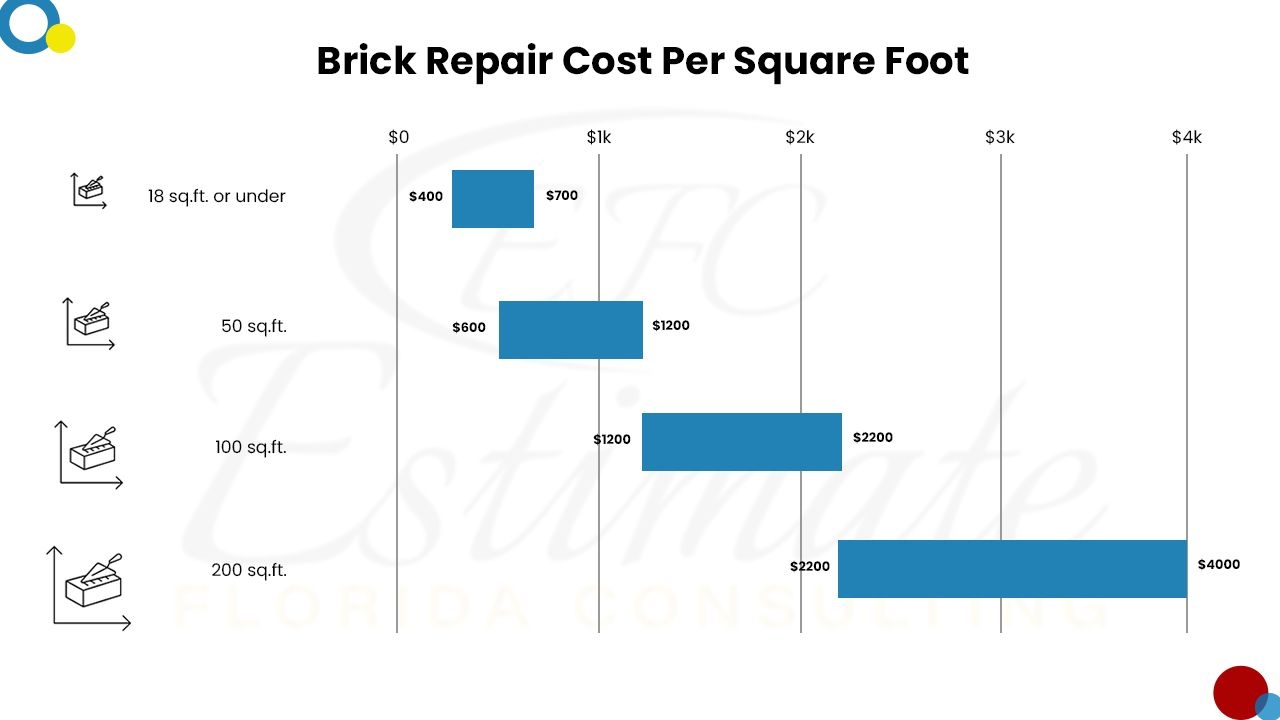
Here’s an overview of typical repair costs based on the area being fixed:
Sq. ft. Measurement | Estimated Cost |
18 sq. ft. or less | $400 – $700 |
50 sq. ft. | $600 – $1,200 |
100 sq. ft. | $1,200 – $2,200 |
200 sq. ft. | $2,200 – $4,000 |
Stone Siding Repair Cost
The cost of repairing stone siding varies depending on the type and complexity of the repair. For basic repairs like fixing chipped, cracked, or buckling stones, you can expect to pay between $30 and $80 per square foot. Simpler jobs, such as repairing mortar, are more affordable, typically costing $8 to $15 per square foot. On the other hand, more complicated work, like replacing stones on upper floors, can range from $70 to $130 per square foot.
If you’re looking to clean and seal natural stone to prevent staining or efflorescence, the cost is around $8 to $10 per square foot. Repairing flashing—where stones covering the flashing need to be removed, fixed, and reinstalled—usually costs $25 to $64 per square foot. If the removed stones can be reused, the cost may be lower.
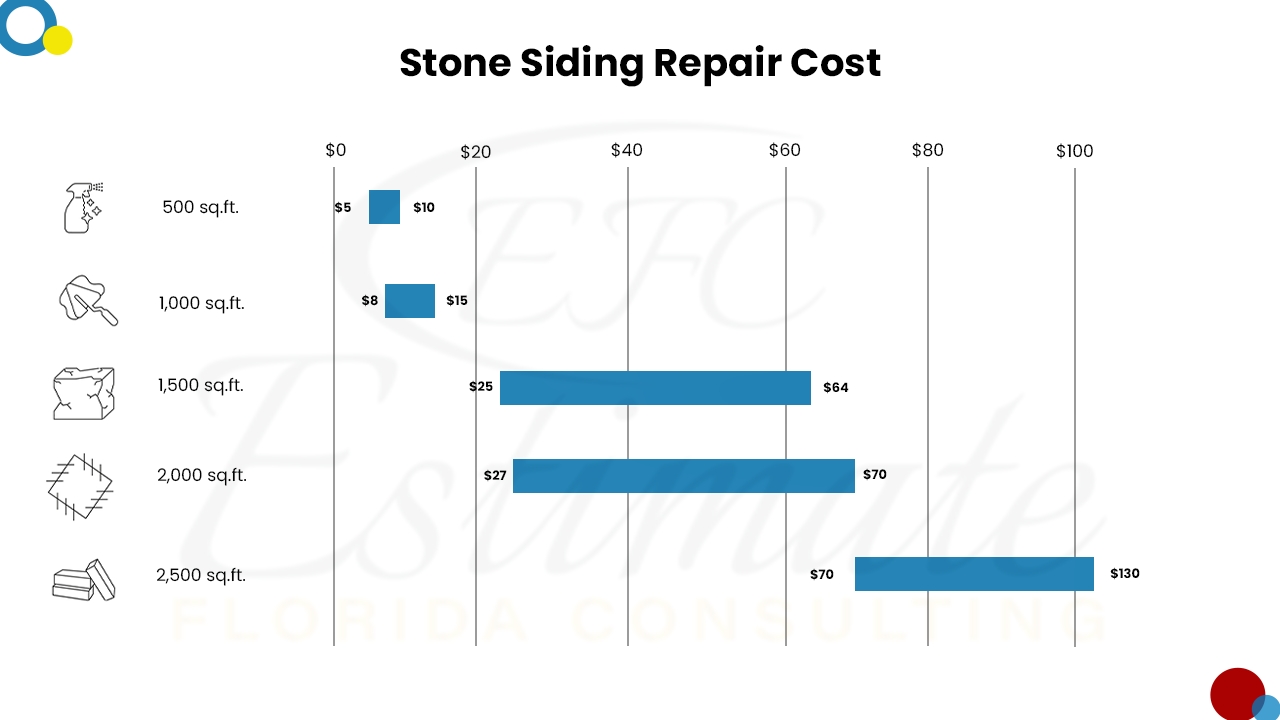
Here’s a summary of common stone siding repair costs:
Type of Repair | Cost |
Cleaning and sealing | $5 – $10 |
Mortar repair | $8 – $15 |
Replacing chipped, cracked, or buckling stone | $25 – $64 |
Repairing flashing | $27 – $70 |
Stone replacement on upper floors | $70 – $130 |
Brick Siding Cost by Type
Brick siding comes in a variety of styles, offering a wide range of prices to fit different budgets and needs. Standard brick siding starts at around $4 per square foot, while more detailed and premium options, like interlocking or handcrafted bricks, can go as high as $29 per square foot. You can choose from traditional full-sized bricks or thinner, more affordable alternatives.
Several factors can influence your choice, such as where the brick siding will be installed and whether it will be the primary siding material. Your decision may also depend on cost or ease of installation. Some brick siding materials come as individual bricks, while others are available as interlocking sheets, making the installation process quicker and more seamless.
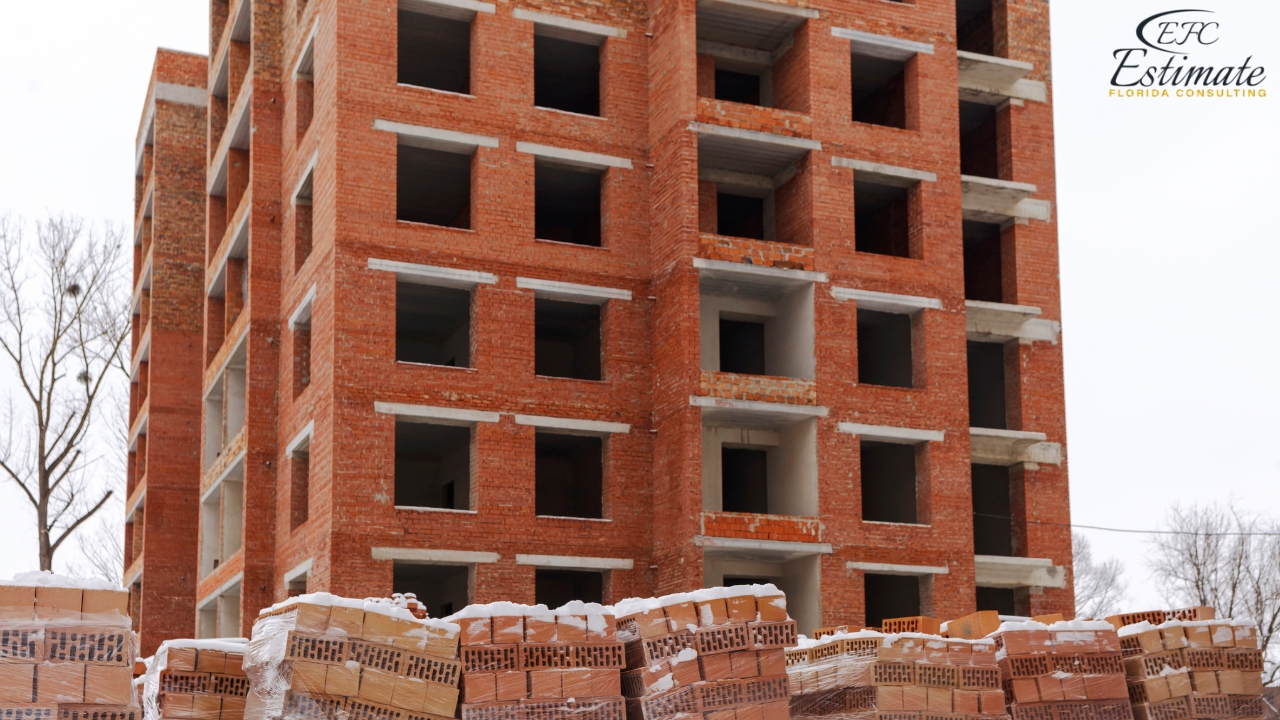
Here’s a cost breakdown of different types of brick siding materials:
Type | Cost per Sq.Ft. (Materials Only) |
Traditional Brick | $4 – $9 |
Face Brick Veneer | $5 – $8 |
Interlocking Brick | $8 – $29 |
Brick Panel | $9 – $15 |
Thin Brick Veneer Strips | $12 – $19 |
Handcrafted Brick | $17 – $29 |
Masonry Construction by Story Height
Masonry for 2-Story Residential Construction
Two-story homes frequently use masonry for load-bearing walls on the ground floor, with additional structural support provided by reinforced columns. The second story often benefits from masonry’s superior weight-bearing capacity, ensuring long-term durability. Additional expenses come from scaffolding, material handling, and the need for precise alignment during construction. For projects requiring more decorative or functional elements, such as intricate brick patterns or stucco finishes, costs may increase further. The masonry work for a two-story home typically ranges from $20,000 to $80,000, with final expenses depending on the home’s size, design intricacies, and the type of masonry materials used.
Masonry for 3-Story Residential Construction
Three-story residential buildings introduce added complexity to masonry work, requiring advanced engineering and structural reinforcements. Taller walls necessitate the use of high-strength materials and detailed planning to ensure stability and compliance with building codes. These projects often include engineered masonry systems to handle the additional load and provide seismic or hurricane resistance. The use of scaffolding, lifts, and safety equipment increases both labor intensity and costs. Masonry work for three-story buildings typically costs between $40,000 and $150,000, influenced by the building’s square footage, layout, and design features.
Masonry for 4-Story Residential Construction
Four-story buildings involve even more specialized masonry techniques, as they must meet stringent structural requirements for taller constructions. This includes thicker walls, reinforced rebar, and advanced waterproofing systems to ensure long-term stability and resilience against environmental factors. Additional costs arise from logistical challenges, such as transporting materials to higher levels and securing proper bracing during construction. These projects often require compliance with strict local building codes, particularly in hurricane-prone areas like Florida. Masonry costs for a four-story building typically range between $60,000 and $200,000, depending on the complexity of the design and site conditions.
Masonry for 5-Story Residential Construction
Five-story residential buildings demand the highest level of expertise and advanced construction techniques in masonry. Walls must be thicker, stronger, and equipped with robust reinforcement systems to handle the increased weight and height. Additional waterproofing, fireproofing, and insulation measures are often required to meet safety and comfort standards. The use of lifts, scaffolds, and enhanced safety protocols further increases labor costs. For these reasons, masonry expenses for five-story structures generally range from $80,000 to $300,000 or more, reflecting the complexity and scale of these projects.
Win More Projects With Us
Masonry Apartment Construction Cost
In Miami-Dade, masonry is a cornerstone of apartment construction because of its superior durability, fire resistance, and ability to minimize noise between units—key features for multi-family dwellings. The costs for masonry work in apartment buildings can range widely, typically from $100,000 to several hundred thousand dollars, depending on the size of the building, the number of floors, and the amenities included. For example, taller buildings with more floors often require reinforced masonry, which adds to the cost. Additionally, the architectural design plays a significant role; intricate patterns or decorative masonry on the exterior can increase expenses significantly. Other features such as community walls, decorative planters, or exterior accents add aesthetic value but can also increase the total project cost. In Miami-Dade, where aesthetics and resilience are critical, these factors are especially relevant.
Masonry Construction Costs by Bedroom Size
While masonry costs aren’t directly tied to the number of bedrooms, the bedroom count often reflects the building’s size and complexity. A higher number of bedrooms usually means a larger footprint, additional partition walls, and intricate layouts, all of which can drive up masonry costs. For instance:
- 2-Bedroom Apartments: Masonry costs might range from $15,000 to $50,000, depending on the design and materials.
- 5-Bedroom Luxury Homes or Apartments: These could exceed $100,000, especially if the project includes high-end finishes, expansive square footage, or custom designs.
Cost Breakdown by Major Masonry-Related Components
Masonry Roofing Support (Parapets and Chimneys)
Parapets and chimneys are essential elements in many buildings, providing not only structural support but also enhancing the architectural design. Parapets, often seen on flat-roofed buildings, act as protective barriers and add an elegant finish to the roofline. Chimneys, on the other hand, are functional structures designed to vent smoke and gases safely while also serving as visual focal points. Costs for these features range from $2,000 to $10,000, depending on factors such as height, material choice (brick, stone, or concrete), and design complexity. Custom designs or taller chimneys may increase costs further due to the additional labor and materials required.
Masonry Walls and Structural Elements
Masonry walls form the backbone of most structures, providing essential load-bearing support and defining the layout of the building. These walls are constructed using materials like concrete blocks, bricks, or reinforced masonry, each affecting the overall cost. Walls with additional reinforcement or insulation for energy efficiency may be more expensive but offer long-term savings on heating and cooling. The cost of masonry walls ranges from $10 to $40 per square foot installed, influenced by the wall’s thickness, reinforcement requirements, and material selection. For larger projects, economies of scale can sometimes reduce the per-square-foot cost, while intricate designs or custom materials may raise the price.
Masonry Foundations and Footings
Foundations and footings made of masonry are critical for the stability and longevity of a building. These components distribute the building’s weight evenly, minimizing settlement or movement over time. Foundations are often built with concrete masonry units (CMUs) or poured concrete, while footings are designed to anchor the foundation securely to the ground. Costs generally range from $5,000 to $20,000, depending on the soil conditions, elevation requirements, and the level of reinforcement needed. Sites with poor soil may require additional excavation or stabilization measures, further increasing the price. Investing in a well-constructed foundation can prevent costly repairs or structural issues down the line.
Masonry Veneer and Cladding
Masonry veneers and cladding serve as both protective layers and decorative finishes, enhancing a building’s curb appeal and weather resistance. Materials like cultured stone, brick veneer, or natural stone are commonly used for these applications. Veneers not only improve the aesthetic value but also protect the underlying structure from moisture and temperature fluctuations, extending the building’s lifespan. Costs for masonry veneers and cladding range from $10 to $50 per square foot, depending on the material and installation complexity. Premium materials like natural stone may cost more but offer unmatched durability and a timeless appearance, while manufactured materials like cultured stone provide a cost-effective alternative.
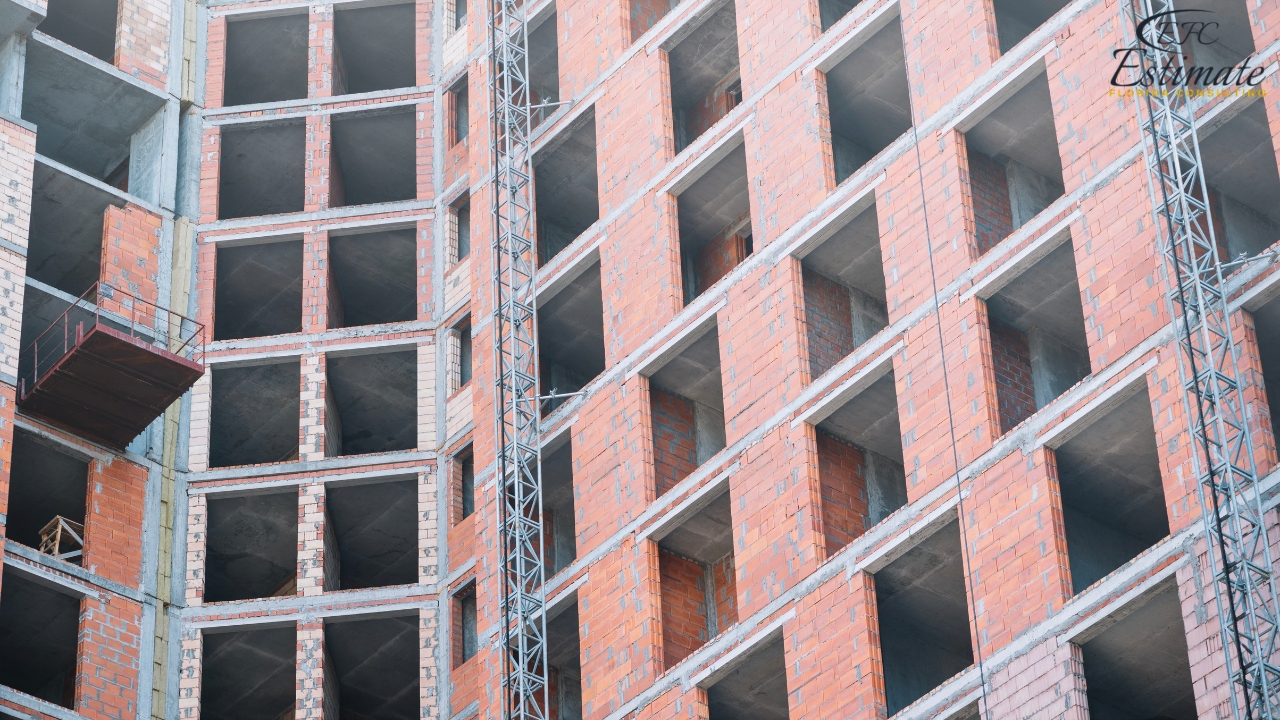
Masonry Fireplaces and Outdoor Kitchens
Masonry fireplaces and outdoor kitchens are popular additions that elevate both the functionality and aesthetic appeal of a property. Fireplaces create a cozy ambiance indoors, while outdoor kitchens add a social and practical element to patios or gardens. These features can be customized with a variety of materials, such as brick, stone, or concrete, and designs can range from simple fire pits to elaborate structures with countertops, sinks, and pizza ovens. Costs typically range from $3,000 to $15,000, with the price influenced by the complexity of the design, material quality, and additional features like built-in storage or lighting. Investing in these custom masonry elements not only enhances your lifestyle but can also increase your property value.
Factors Affecting Masonry Costs
The cost of masonry work is influenced by several key factors that vary depending on the project type, location, and specific requirements. Each factor must be carefully considered to ensure the project remains on budget while delivering high-quality results. Below is a detailed exploration of these elements:
Material Selection
The choice of masonry materials plays a crucial role in determining the overall cost. Common materials include brick, concrete blocks, stone, and veneer, each with unique characteristics and price points. For instance, bricks are widely used for their durability and classic aesthetic, making them a popular choice for residential projects. Concrete blocks are versatile and cost-effective, often used for structural elements in both residential and commercial buildings. Stone and veneer materials, while more expensive, offer premium aesthetics and durability, suitable for upscale projects. The selection process should align with the project’s purpose, climate considerations, and long-term maintenance requirements, as these factors can significantly influence both upfront and ongoing costs.
Labor Costs
Labor costs account for a significant portion of masonry expenses and are directly tied to the expertise required for the project. Skilled masons are indispensable for ensuring precision, strength, and durability in masonry work. Labor costs can vary based on the complexity of the design, regional wage rates, and the availability of experienced professionals. For example, intricate projects like decorative stonework or custom fireplaces demand a high level of craftsmanship, increasing labor costs. Additionally, projects in areas with labor shortages or high demand may face inflated rates. Hiring experienced masons ensures the work is done efficiently, reducing the risk of costly errors or future repairs.
Site Conditions
The physical condition of the construction site significantly impacts masonry costs. Factors such as soil stability, site accessibility, and the extent of site preparation needed can increase or decrease expenses. For instance, sites with poor soil may require additional excavation, stabilization, or reinforced foundations, all of which add to the cost. Similarly, locations that are difficult to access, such as those in urban areas with limited space or remote sites far from suppliers, may incur higher transportation and labor costs. Proper site assessment and preparation are essential to address these challenges and avoid unexpected delays or expenses during construction.
Project Scale
The size of the project plays a major role in determining the total cost of masonry work. Larger projects often benefit from economies of scale, where bulk purchasing of materials and more efficient use of labor can reduce the cost per unit. For example, constructing an apartment complex may result in lower material costs per square foot compared to a single residential wall. However, larger projects also involve additional complexities, such as detailed planning, specialized equipment, and extended timelines, which can offset some of the savings. Smaller projects, while simpler, may not qualify for bulk discounts and may have proportionally higher costs per square foot.
Local Building Codes
Compliance with local regulations, such as those in Miami-Dade County, is a critical consideration in masonry projects. These building codes may dictate specific requirements for materials, reinforcement techniques, or additional safety features, all of which can influence costs. For example, structures in hurricane-prone areas may need extra reinforcements or wind-resistant materials to comply with safety standards. Working with professionals who are well-versed in these regulations ensures that the project meets all legal and safety requirements, avoiding potential fines, delays, or costly redesigns.
Get Acquainted with Estimation
Mastering Bids: 12 Pro-Level Bidding Tips for Construction Managers
Maximize Profits: Budgeting Hacks for Big Construction Projects
How We Calculate Masonry Costs
At Estimate Florida Consulting, we take a meticulous and comprehensive approach to calculating masonry costs. This ensures accuracy, transparency, and alignment with your project’s goals and budget. Below is an overview of our detailed process:
Detailed Material Quantification
We begin by thoroughly analyzing your project specifications to determine the exact quantity of materials needed. This includes calculating the number of bricks, blocks, or stone units required, as well as any supplementary materials like mortar, reinforcement bars, or insulation. Accurate material quantification minimizes waste, ensures cost efficiency, and avoids delays caused by material shortages. By tailoring this calculation to your project’s unique needs, we help you achieve optimal resource allocation.
Labor Analysis
Our estimates account for the time, expertise, and number of workers needed to complete the project efficiently. We consider the complexity of the design, the required skill level, and the project timeline to ensure accurate labor cost predictions. For example, a straightforward masonry wall may require fewer skilled workers, while a custom-designed stone façade or fireplace demands more time and expertise. This thorough analysis ensures that labor costs are allocated appropriately without compromising on quality or efficiency.
Equipment and Tools
We include the cost of any equipment or tools required for the project, whether rented or purchased. This may involve scaffolding, mixers, power tools, or specialty equipment for handling specific materials like stone or veneer. Factoring in equipment costs ensures that all resources are readily available, preventing delays and maintaining project momentum. Our team evaluates whether renting or purchasing equipment offers the most cost-effective solution for your specific project.
Permits and Compliance
Obtaining permits and ensuring compliance with Miami-Dade County’s building codes are essential steps in the construction process. These costs are integrated into our estimates to provide a clear picture of the total budget. Our team is experienced in navigating local regulations, ensuring that all required permits are secured promptly and that the project meets or exceeds compliance standards. This proactive approach helps avoid fines, legal issues, or costly redesigns later in the process.
Contingency Planning
To address potential unforeseen expenses, our estimates include a contingency buffer. This accounts for variables like material price fluctuations, unexpected site conditions, or design changes during construction. By planning for these possibilities, we help ensure that your project stays on budget, even in the face of unexpected challenges.
Download Template For Masonry Construction Project Breakdown
- Materials list updated to the zip code
- Fast delivery
- Data base of general contractors and sub-contractors
- Local estimators

Advantages of Professional Masonry Cost Estimation
Choosing Estimate Florida Consulting for your masonry cost estimation needs provides several distinct advantages. Our expertise and systematic approach help streamline your construction process while ensuring cost efficiency. Here’s how you benefit:
Accurate Budgeting
Our detailed and precise estimates eliminate guesswork, helping you allocate funds effectively. By accounting for all potential costs, we prevent unexpected expenses and ensure that your project stays within budget.
Time Savings
Cost estimation can be a time-consuming process, especially for complex projects. With our professional services, you can focus on managing other aspects of your project while we handle the intricacies of cost calculation and compliance.
Improved Decision-Making
Our comprehensive cost breakdowns provide clarity on where your budget is being allocated. This allows you to make informed decisions about materials, labor, and project scope, ensuring that your priorities are met without unnecessary expenses.
Reduced Risk
Accurate cost estimation minimizes the risk of underestimating or overestimating expenses. This helps avoid project delays, financial strain, and potential compromises in quality. Our systematic approach ensures that every aspect of the project is accounted for, reducing uncertainties.
Tailored Estimates for Miami-Dade County Projects
Every construction project is unique, and so are the factors that influence masonry costs. At Estimate Florida Consulting, we provide customized estimates tailored to the specific requirements of your project. Whether you’re building a high-rise in downtown Miami, developing a residential community in Miami-Dade County, or designing a custom home in Key Biscayne, our local expertise ensures accuracy and reliability. We consider site-specific challenges, material preferences, and compliance requirements to deliver estimates that align perfectly with your goals. With our professional support, you can move forward with confidence, knowing your project is in expert hands.
Question Answer
Frequently Asked Question
The cost of a square foot of masonry wall can vary depending on factors such as materials, location, and complexity. On average, masonry wall installation can cost anywhere between $10 to $30 per square foot. This includes both the materials (like brick, stone, or concrete block) and labor costs. Prices may fluctuate based on your specific project needs, such as wall height or additional finishes.
A masonry estimate is a detailed breakdown of the expected costs for completing a masonry project. This estimate typically includes labor, materials, equipment, and any additional charges such as permits or specialized finishes. It helps clients understand the projected budget for the project and serves as a guide for both the contractor and the homeowner.
Charging for masonry work involves considering several factors, including the type of material used, the project's complexity, and the time it takes to complete. Contractors typically charge either by the hour or by the square foot. For example, labor rates might range from $30 to $60 per hour, while pricing by square foot might range from $10 to $30. Other factors such as site preparation, disposal fees, and additional materials can influence the final cost.
To calculate the amount of masonry required, first measure the length, height, and thickness of the wall or structure. Multiply the length and height to determine the square footage, and then factor in the thickness of the wall to determine the volume of materials needed. Don't forget to account for waste, as approximately 10% extra materials are often required to accommodate cutting or damage during installation.
When quoting a masonry job, contractors will assess the project scope, material type, labor costs, and any additional requirements such as permits or specific finishes. Contractors will then provide a comprehensive quote that includes the cost per square foot or per block, estimated labor costs, and any extra charges for site preparation or waste disposal. It's essential to provide an itemized breakdown so the client understands the costs involved.
Masonry work is considered expensive due to the high cost of materials, the skilled labor required, and the time-consuming nature of the work. The materials themselves—such as brick, stone, and concrete blocks—can be costly, especially if high-quality or custom products are used. Additionally, masonry requires skilled craftsmen who need to carefully plan, measure, and install the materials, which adds to the labor costs.
The cost to lay a block typically ranges from $2 to $5 per block, depending on the size of the project and location. This pricing includes both labor and material costs but may vary based on factors like accessibility, wall height, or specialized design elements. Larger or more complex projects can increase the rate per block due to additional time and expertise required.
Masonic charges refer to the fees associated with masonry work, including labor, materials, and other associated costs. This may include costs for site preparation, waste removal, equipment rental, and other overheads that contractors must charge in order to complete a project. It's essential to ensure that all charges are itemized in an estimate for transparency.
A typical pallet of concrete blocks contains around 72 to 96 blocks, depending on the size of the blocks. This can vary based on the manufacturer and type of block. Generally, purchasing blocks by the pallet offers a cost-effective option, especially for large masonry projects. However, the final number of blocks required will depend on your project's size and specifications.
Masons typically charge between $2 to $5 per block, depending on factors like the type of block, the complexity of the job, and location. The price may include both the material and labor costs for laying the block. It's important to get an itemized quote for accurate pricing and to ensure all costs are accounted for in the estimate.
Comprehensive Trade-Specific Estimates
At Estimate Florida Consulting, we offer detailed cost estimates across all major trades, ensuring no part of your project is overlooked. From the foundation to the finishing touches, our trade-specific estimates provide you with a complete and accurate breakdown of costs for any type of construction project.

Testimonials
What Our Clients Say
We take pride in delivering accurate, timely, and reliable estimates that help contractors and builders win more projects. Our clients consistently praise our attention to detail, fast turnaround times, and the positive impact our estimates have on their businesses.
Estimate Florida Consulting has helped us win more bids with their fast and accurate estimates. We trust them for every project!

Steps to Follow
Our Simple Process to Get Your Estimate
01
Upload Plans
Submit your project plans, blueprints, or relevant documents through our online form or via email.
02
Receive Quotation
We’ll review your project details and send you a quote based on your scope and requirements.
03
Confirmation
Confirm the details and finalize any adjustments to ensure the estimate meets your project needs.
04
Get Estimate
Receive your detailed, trade-specific estimate within 1-2 business days, ready for your project execution.





